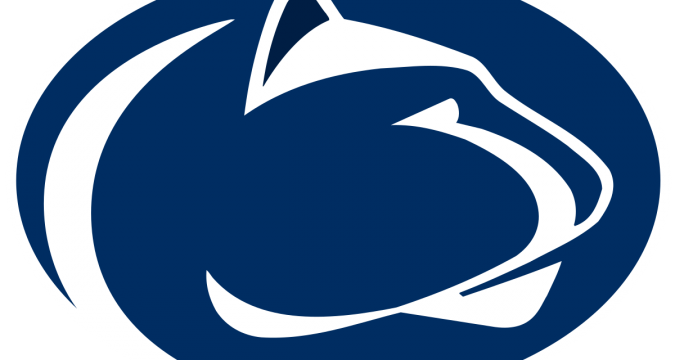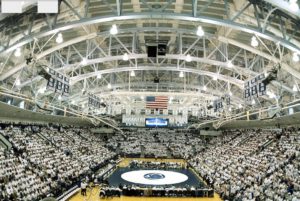
Courtesy of John Harrison
Charlie was a two-time All-American wrestler, an All-American football player and a finalist for an NCAA “top five student-athlete” award while at Penn State. He was a second round draft choice of the Kansas City Chiefs and subsequently played 200 games in the NFL. He holds a Bachelor’s Degree from Penn State and a Master’s Degree from Webster University (Missouri). He is presently the head football coach and assistant wrestling coach at Glendale High School in Springfield, MO.
When I think of Charlie Getty I get a smile on my face and I think anybody that knows him would do the same–he’s such a tremendous person both on and off the competition field. He was also an outstanding athlete. He’d come out for wrestling after football ended; he’d only be with us for about two months–yet he’d do all the work that anybody was doing in the wrestling room plus a little more. He never looked for special treatment; he was a good team leader and a good friend to everybody on the team. And he was a good strong wrestler who moved like a big cat.
Two stories come to mind when I think of Charlie. The first relates to a return trip from an away match. Charlie hadn’t been feeling well and told us he wasn’t hungry when we stopped to eat in a diner. He decided to order “something” anyway which turned out to be five cheeseburgers. When they arrived, he put them down like they were pieces of candy. We were wondering what he would have eaten if he was feeling well. The other story took place during his senior year. He had been selected to play in several football all-star games, but he turned them all down because he wanted to focus on getting ready for the NCAA wrestling tournament. One day we were in the wrestling room and the phone rang. It was Hank Stram, head coach of the Kansas City Chiefs, and he told Charlie that the Chiefs wanted to fly him out to Kansas City right away to take a look at him. Charlie, twenty-one years old, told Hank that he couldn’t come out until after the NCAA tournament, but that he’d run out to Kansas City, if need be, after the tournament! As it turned out, Hank was happy to find out that Charlie was a wrestler because one of the Chiefs’ standout linemen, Curly Culp, had been a collegiate wrestler and Hank was well aware of how much a football player (especially a lineman) could benefit from being a wrestler. Hank wished Charlie well in the tournament, the Chiefs subsequently drafted Charlie and he went on to have a standout nine-year career with the Chiefs. Charlie was a true champion in every sense of the word. He was a heck of a person and a great competitor. They don’t come any finer than Charlie.
-former PSU head coach, Rich Lorenzo
Charlie, what have you been doing since you graduated from Penn State?
That was a long time ago! I played in the NFL for ten years. The first nine were with Kansas City and the last year was with the Green Bay Packers. I retired in 1984. I also started teaching in 1984. I have been at four different schools: William Chrisman in Independence, Missouri, Raytown, Blue Springs and now, Glendale High School in Springfield, MO. We are very happy here in Springfield.
How has the PSU wrestling experience impacted your life/career?
I still love wrestling! I still coach it. I still wrestle a little bit when my knees allow. Despite my love for football, wrestling seems to be a sport that is conducive to getting closer to your athletes. With football, you are trying to get eleven people to work together, which can be frustrating. In wrestling, each person can develop his own individual style. I believe wrestling is the best preparation for football that an athlete can undertake. No other sport demands so much but also teaches so much in terms of body awareness, toughness, and tenacity. At Glendale, we insist that our football players at least try wrestling if they are not on the basketball team.
Charlie, what appeals to you about coaching?
I love coaching, because I love kids. I knew I was hooked as a coach when I realized I enjoyed my athletes’ success more than I enjoyed my own. That was during the first wrestling tournament I ever coached in December of 1984. How did you get started in wrestling? My two best friends in high school decided that the three of us were not good basketball material. They wanted to go out for wrestling and since we did everything together, I went along. Good decision!
What are your best memories from the years you spent as a PSU wrestler?
My favorite memories are the recent ones. I will never forget the reunion of a couple of years ago. It was so great to see how much we had all changed yet hadn’t changed at all. I asked Andy Matter about his two boys wrestling at Penn. I wanted to know if he could still take them. He said, “Of course!” Jerry Villeco is coaching his sons. I asked him the same question and got the same answer. Good people and good times. I also remember all the eating places that Sam (Lestz), the coaches–Bill (Koll) and Rich (Lorenzo), Eddie (Sulkowski) and I would go to after all the other guys (who had to weigh in!) were in bed. Sam and Eddie had a restaurant in every town and sometimes three!
Do you still follow wrestling?
I still coach wrestling, so I do a little better with what is happening at Glendale High School and in the state of Missouri than I do with Penn State these days. I did enjoy seeing the team three years ago and especially meeting Kerry McCoy. I’m just glad I am too old to ever have to wrestle him!
How has collegiate wrestling changed since you were a collegiate wrestler?
Wrestling is a sport that changes and yet stays the same. I think the wrestlers are stronger today. That is true in every sport and is due mostly to the emphasis placed on the weight room. Riding time is gone (at the high school level) and good riddance! You still have to be able to wrestle on your feet to win the big ones. The matches keep getting shorter. I sat with one of PSU’s national champs from 1941 at the reunion and he could not get over how many times they stopped wrestling for little things like injuries and blood. He said in his day, they wrestled nine minutes and then worried about who was hurt. We all tend to look back and think we were tougher than we really were. These guys today are right on the edge. They are better trained and better coached than we were. The gap between the collegiate scene and the international scene has closed.
What advice do you have for collegiate wrestlers today?
Enjoy the time you have to compete because it goes so fast. I love the scene in the move, Field of Dreams, where Costner goes back to meet with Burt Lancaster’s character in his doctor’s office. Lancaster says, “The most important moments of your life pass and you don’t notice because you are so busy that you don’t see their importance. Later, you realize as you look back which moments were important, but by then the time is passed forever.” (Or something like that!) That is true. I never realized while I was doing it how important all that stuff would be to me when I was too old to do it anymore. I’d trade youth for wisdom any day!
Thanks Charlie!

